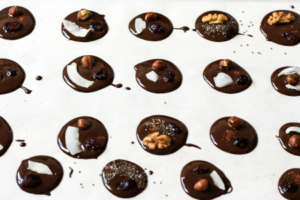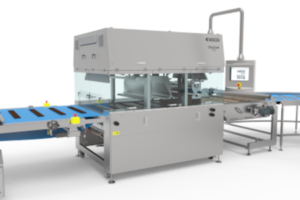Insight by major convection technology enterprise on ways to minimise rising expense in energy
In an industry where high energy consumption is unavoidable, it is essential that manufacturers exploit every means possible to keep usage down. David Emerson, product specialist at Spooner Industries, leaders in forced convection technology, explores the progress being made in monitoring and regulating energy efficiency in industrial baking.
An energy intensive industry
With the cost of energy continually on the rise and often resulting in crippling bills, the search for increased energy efficiency measures has been a Holy Grail for UK manufacturers for years. Mounting red tape and regulatory compliance have increased the pressure on energy-intensive businesses to find ways to manage and reduce energy consumption, improve cost efficiency and build environmental responsibility. In manufacturing, the burden is even greater with energy usage for production lines far exceeding that of service industries with only standard office equipment to power.
Energy efficiency in baking
There are few manufacturing businesses, however, that feel the cost of energy and the need for efficiency improvements so keenly as the bakery sector. In the UK, 2,000 gigawatt hours (GWh) of energy, which releases around 570 tonnes of CO2 annually, is used to produce 2.5 million tonnes of baked goods every year. Although the baking process inevitably consumes energy at every turn, it also presents a multitude of opportunities to streamline energy usage with the introduction of new technologies and practices – whether through improved components, more efficient processes, up-to-date facilities or even changes at managerial level. Doing all this, while maintaining the quality of the product, has long been the ‘dream’ for baking manufacturers.
Energy innovations
Strides have been made, with innovations to minimise the amount of energy required in the baking process and maximise the output and efficiency of the energy that is used. Research carried out at Spooner’s R&D centre in collaboration with other industry leading bodies, has revealed exactly how energy is used in ovens, on the baking line, and onsite. More importantly, we have established there is potential, with the right innovations, to reduce gas consumption by up to 20%. Heat recovery from waste gases which are re-directed to heat-incoming combustion air, and reducing the amount of through metal in the oven to minimise heat loss, are just two adjustments that can have a major impact. Using thermal imaging alongside other contemporary technologies, we monitored the volumes of gas produced during baking from the baked products and from combustion, as well as noting how improving the management of flue gas can also improve oven efficiency.
Variable speed drives and sensors also have a significant role to play in increasing the efficiency of energy usage. Dynamically matching exhaust fans to the volume of gases produced by the bread and the combustion air means that less exhaust is taken out and less air needs to be heated up and pumped into the oven.
Anyone looking to increase the energy performance of a plant should measure the amount of gas consumed, the temperature of the exhaust, the oven wall and roof temperatures, the temperature of tins going in and out of the oven and the heat levels of the conveyor belt. Other factors to investigate are weight, moisture levels, the temperature of dough and the flow of air at the mouths of the ovens. All of these may influence the efficiency of equipment.
Our most recent development integrated the terminal ends inside the oven body, bringing with it both energy and space-saving benefits. At the feed and delivery ends of the oven, sprockets are contained inside the oven zone. This ensures that minimal heat from the hot conveyor escapes from the oven, improving its thermal efficiency and producing savings of up to 13% in gas usage.
The wall below the infeed transfer conveyor is fitted with bolt on panels which allow greater access to the oven entry. This process effectively eliminates the wasted energy that would otherwise escape from the terminal ends of traditional ovens. A potential loading and unloading issue was soon overcome by our engineering development team.
Energy efficient, cost efficient
At Spooner we have incorporated a number of energy saving measures into our custom-designed ovens and implemented several techniques to decrease energy use and save money.
For example, pre-heating the air used in gas burners from 25°C to 140°C and recovering more than 50% of the energy lost in the exhaust flue has resulted in reduced gas consumption and a smaller carbon footprint; and, consequently, the company’s climate change levy. Heat recovery modules can be fully insulated and include stainless steel outer panels. Modules can be retrofitted as well as supplied with a new installation.
Optimum recovery levels once these measures have been taken can save 115kW; and combined with integrated terminal ends can save up to 20% when compared to a similar oven (such as an older impingement oven) without these features. Savings could exceed £70k per year and, depending on the size of operation, this equipment can pay for itself within the first year of installation.
Safety first
With all efficiency improvements it is imperative not to lose sight of safety. At Spooner Industries, we have recently implemented an innovation which not only improves energy efficiency but has also reduced safety risks on the factory floor.
The installation of internal walkways for access to essential oven cleaning and maintenance has replaced the old method of crawling through ovens which may be mistakenly believed to be cool, only to result in injury and in some cases, death. In terms of efficiency, a walkway system introduces a door at either end, replacing several access points throughout the length of the oven, which in turn results in significantly reduced heat and gas leakage.
These recently introduced innovations in energy efficiency measures are now available on all our custom-designed oven models from Spooner.
Moving forward
With major leaps forward in both energy savings and efficiency in the bakery world over the last 10 years, the future is set for an even greener, more cost-effective future. While the industry continues innovating and updating its manufacturing processes, the benefits will have a positive impact on us all.









